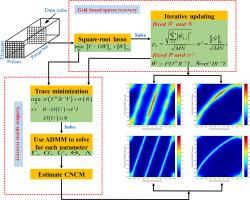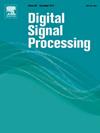基于平方根套索的无网格SR-STAP算法抑制机载雷达杂波
IF 3
3区 工程技术
Q2 ENGINEERING, ELECTRICAL & ELECTRONIC
引用次数: 0
摘要
基于网格的稀疏恢复时空自适应处理(SR-STAP)算法需要对角度多普勒平面进行离散,以构造过完备基矩阵。这个过程可能会导致离网问题,导致性能下降。为了解决这一问题,本文提出了一种基于平方根Lasso(SRL)的无网格SR-STAP算法。首先,通过引入辅助变量,采用交替优化的方法得到SRL的迭代解。其次,将上述迭代解代入原问题,将SRL问题转化为杂波协方差矩阵(CCM)的迹最小化问题。轨迹最小化问题是凸的,可以在连续域内全局求解,从而避免了离网问题。第三,为了适应噪声未知环境,导出了噪声功率的封闭解。最后,为了提高计算效率,在交替方向乘法器(ADMM)框架下对所需参数进行了迭代求解。仿真结果表明,与典型的基于网格的SR-STAP算法相比,该算法能够克服离网问题,具有更好的杂波抑制性能和更低的计算复杂度。本文章由计算机程序翻译,如有差异,请以英文原文为准。

Gridless SR-STAP algorithm based on square-root lasso for airborne radar clutter suppression
The grid-based sparse recovery space-time adaptive processing(SR-STAP) algorithm requires the angular Doppler plane to be discretised in order to construct an overcomplete basis matrix. This process can result in off-grid problem and lead to a decline in performance. To address this issue, a gridless SR-STAP algorithm based on square-root Lasso(SRL) is proposed in this paper. Firstly, by introducing auxiliary variables, we obtain an iterative solution to the SRL using alternating optimization. Secondly, substituting the above iterative solution into the original problem transforms the SRL into a trace minimization problem for the clutter covariance matrix(CCM). The trace minimization problem is convex and can be solved globally in the continuous domain, thus avoiding the off-grid problem. Thirdly, to accommodate the noise unknown environment, a closed-form solution for the noise power is derived. Finally, in order to improve the computational efficiency, we solve iteratively for the required parameters in the framework of alternating direction method of multipliers(ADMM). Simulation results demonstrate that the proposed algorithm can overcome the off-grid problem, exhibits better clutter suppression performance and lower computational complexity than typical grid-based SR-STAP algorithm.
求助全文
通过发布文献求助,成功后即可免费获取论文全文。
去求助
来源期刊

Digital Signal Processing
工程技术-工程:电子与电气
CiteScore
5.30
自引率
17.20%
发文量
435
审稿时长
66 days
期刊介绍:
Digital Signal Processing: A Review Journal is one of the oldest and most established journals in the field of signal processing yet it aims to be the most innovative. The Journal invites top quality research articles at the frontiers of research in all aspects of signal processing. Our objective is to provide a platform for the publication of ground-breaking research in signal processing with both academic and industrial appeal.
The journal has a special emphasis on statistical signal processing methodology such as Bayesian signal processing, and encourages articles on emerging applications of signal processing such as:
• big data• machine learning• internet of things• information security• systems biology and computational biology,• financial time series analysis,• autonomous vehicles,• quantum computing,• neuromorphic engineering,• human-computer interaction and intelligent user interfaces,• environmental signal processing,• geophysical signal processing including seismic signal processing,• chemioinformatics and bioinformatics,• audio, visual and performance arts,• disaster management and prevention,• renewable energy,
 求助内容:
求助内容: 应助结果提醒方式:
应助结果提醒方式:


